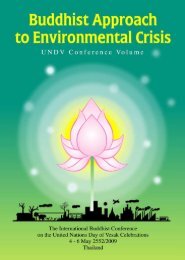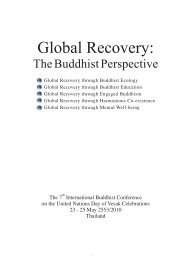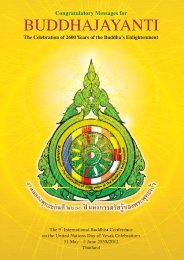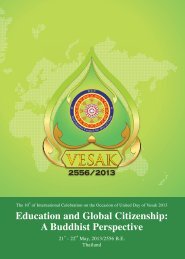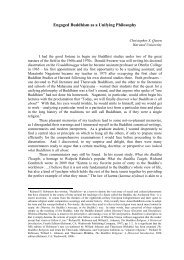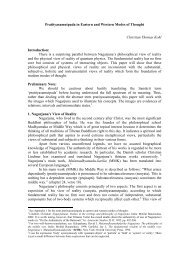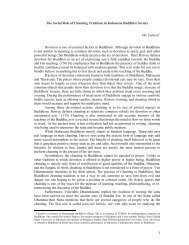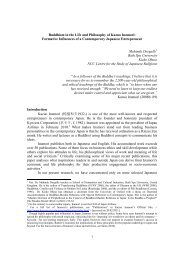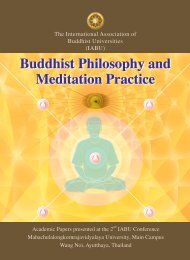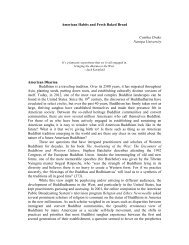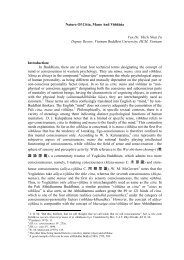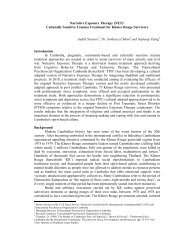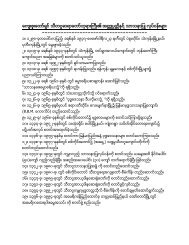An Analytical and Creative Study of the Buddhist Theory and ...
An Analytical and Creative Study of the Buddhist Theory and ...
An Analytical and Creative Study of the Buddhist Theory and ...
Create successful ePaper yourself
Turn your PDF publications into a flip-book with our unique Google optimized e-Paper software.
There are three main reasons for not naming <strong>the</strong> mental illnesses.<br />
1) Physical illnesses are durable <strong>and</strong> <strong>the</strong>y can be easily identified while <strong>the</strong> mental<br />
illnesses are momentary <strong>and</strong> cannot be identified with certainty.<br />
2) It is <strong>the</strong> nature <strong>of</strong> human beings that <strong>the</strong>y always depend on concepts indicated by<br />
specific terms <strong>of</strong> language in order to confirm <strong>the</strong>ir existence in <strong>the</strong> momentary world.<br />
Once <strong>the</strong>y attach to a particular concept or word such as stress, depression or phobia<br />
referring to a mental illness <strong>the</strong> same word becomes a mental problem. 12 It cannot be<br />
easily removed from <strong>the</strong> mind. Fur<strong>the</strong>r <strong>the</strong> mental illness though we identify with<br />
some characteristics <strong>the</strong>y never exist permanently. Searching for characteristics to<br />
identify mental illness is a deliberate attempt to deceive oneself. But <strong>the</strong> problem is<br />
that without naming an illness one cannot prescribe medicine. The delusion is that<br />
<strong>the</strong>y believe mind is related to brain. As to Buddhism mind is a specific faculty in<br />
human personality <strong>and</strong> it is not only related to brain but to all <strong>the</strong> five physical sense<br />
faculties.<br />
3) <strong>Buddhist</strong> psycho<strong>the</strong>rapeutic methods are mainly directed to change <strong>the</strong> mentality <strong>of</strong><br />
persons <strong>and</strong> <strong>the</strong>y do not pay much attention to change <strong>the</strong> environment or o<strong>the</strong>r<br />
external or physical factors so as to bring <strong>the</strong> mentality into a calm status.<br />
Practice <strong>of</strong> psycho-<strong>the</strong>rapy is also based on a simple formula which can be exp<strong>and</strong><br />
<strong>and</strong> extend to meet with any mental problem <strong>of</strong> beings. The practice has three gradual<br />
stages:<br />
i. development <strong>of</strong> moral behavior - behavioral <strong>the</strong>rapy<br />
ii. development <strong>of</strong> concentration - psychological <strong>the</strong>rapy<br />
iii. development <strong>of</strong> underst<strong>and</strong>ing - cognitive <strong>the</strong>rapy<br />
The first type <strong>of</strong> <strong>the</strong>rapy refers to <strong>the</strong> restrainment <strong>of</strong> <strong>the</strong> five senses which are<br />
mainly responsible for <strong>the</strong> physical <strong>and</strong> verbal behavior <strong>of</strong> man. 13 The second type refers<br />
to <strong>the</strong> restrainment <strong>of</strong> <strong>the</strong> above mentioned mental disorders namely greed, hatred <strong>and</strong><br />
delusion-conceit. 14<br />
The third type <strong>of</strong> <strong>the</strong>rapy concerns <strong>the</strong> development <strong>of</strong> underst<strong>and</strong>ing <strong>of</strong> people<br />
regarding <strong>the</strong> true nature <strong>of</strong> <strong>the</strong> world <strong>of</strong> experience. 15 These three stages are mutually<br />
interconnected <strong>and</strong> <strong>the</strong>y support for <strong>the</strong> restrainment <strong>and</strong> development <strong>of</strong> each aspect<br />
gradually. Therefore, in <strong>Buddhist</strong> practice <strong>the</strong>se three stages should be connected with<br />
every method <strong>of</strong> psycho-<strong>the</strong>rapy. 16<br />
It is not out <strong>of</strong> context to mention <strong>the</strong> relationship <strong>of</strong> physical body with <strong>the</strong> above<br />
stated three aspects <strong>of</strong> mental defilements namely greed, hatred <strong>and</strong> delusion. The<br />
Bhesajjamañjusā, <strong>the</strong> one <strong>and</strong> only Āyurvedic Pāli work available at present, states at <strong>the</strong><br />
beginning that mental health should be maintained in accordance with <strong>the</strong> Tripiṭaka <strong>and</strong><br />
Bhesajjamañjusā instructs to establish physical health. According to <strong>the</strong> Āyurveda all<br />
physical illnesses are related to imbalance <strong>of</strong> <strong>the</strong> three humors - phlegm, bile <strong>and</strong> air. The<br />
Visuddhimagga mentions that <strong>the</strong>se three humors are connected with mentality as<br />
follows:<br />
12<br />
13<br />
14<br />
15<br />
16<br />
Adhivacanasamphassa, D. 11., p. 62; M. 1., p. 113 D. 111., p. 86<br />
sīla, D. 111., p. 235<br />
samādhi, A. 111., p. 12<br />
paññā, D. 1., p. 245<br />
S. 111., p. 83



